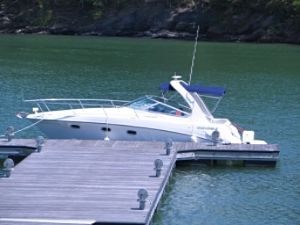|
With the introduction of E-15 this fall, you might just see more stations with non-alcohol pumps due to the damage E-15 will cause.
Increase of ethanol in gas will cause damage to certain vehicles
Published: Sunday, September 04, 2011, 8:15 AM Updated: Sunday, September 04, 2011, 8:31 AM
By Bob Marshall, The Times-Picayune The Times-Picayune
I was trying to summarize the nightmare Pete Landry was describing, and suggested this: Come fall, Louisiana's 320,000 boaters will begin unwittingly filling their tanks with the new 15 percent ethanol fuel blends (E-15), resulting in millions of dollars in unnecessary damage, not to mention broken dreams.
"Oh no," Landry said, "It's much worse than that."
Worse?
"This won't just impact sportsmen. The E-15 also can't be used in motorcycles, jet skies and any lawn equipment or anything else that that uses these small, oil-cooled engines.
"We're talking probably millions of people impacted. We're facing a real crisis."
Landry is no Chicken Little. He's a retired oil- and petrochemical-industry chemist who has spent the past few years as a pro-bono researcher investigating the impacts of ethanol blends on sportsmen and others. When you check out the results on his website, PeteLandrysRealGas.com, you realize the sky really could fall.
Some history.
In 2007, President George Bush signed the Energy Independence and Security Act, which, among other things, required a 20-percent reduction in gasoline consumption by 2017. Much of that was to be achieved by the use of renewable fuels, a goal encouraged by a 45-cent per gallon tax credit to refiners for producing ethanol blends -- the Volumetric Ethanol Tax Credit.
This was a hugely popular event across political lines, but the euphoria didn't last long. Turned out corn-based ethanol actually costs more energy to produce than it saves. The rapid expansion of corn acres resulted in an increase in fertilizers that harm waterways, a loss of wildlife habitat, and soaring food prices worldwide.
While those impacts were generating headlines, what had been thought would be a small list of costs to a whole range of internal combustion engines began climbing. Ethanol, which is basically grain alcohol, collects moisture in fuel tanks, and is corrosive to hoses and engine parts not specifically engineered to handle it. That list would only climb as the refiners moved to meet the government's gradually increasing percent of ethanol.
This fall, we'll be hitting the E-15 mark, a level considered unsuitable even for new outboards, almost all small engines, and any car built before 2001.
The Environmental Protection Agency will require retailers to post a label on pumps stating the fuel should not and, in fact, cannot legally be used in anything other than passenger vehicles produced after 2001 and Flue-fuel vehicles.
But Landry says chaos is bound to ensue for two reasons: That label is much too small and not specific enough, and neither state nor federal governments are requiring refiners and retailers to produce enough ethanol-free fuel.
In fact, the alternative fuel subsidies give refiners a market incentive to produce most, if not all, of their fuel with ethanol, a far higher volume than the government currently requires. In June, the Marathon refinery in Garyville, which had been the state's largest ethanol-free producer, went all-ethanol. Since then, Landry said, the list of gas stations selling ethanol-free fuel dropped by 54 to just 977 -- this out of an estimated 3,650 stations.
"Availability is a huge problem for retailers," he said. "And that's going to get worse. Louisiana now has four refineries producing ethanol-free fuel, and that number could drop because a federal exemption for small refineries is about to expire."
"Ethanol-free gas is already more expensive, and when we start losing in-state refineries, it will just go higher," Landry said. "My fear is that when this E-15 goes into effect, people who don't know the danger will pull up to a gas station and miss that label, or just look at the price and go to the cheaper fuel and do real damage to their engines."
So what can be done?
Some help may be coming soon as Congress considers repealing what has become a $5 billion annual subsidy of ethanol. That could lead some refiners into becoming producers of ethanol-free fuels.
But what really needs to happen is for governments -- state and federal -- to require retailers to offer at least one pump of non-ethanol fuel. That would provide the market for refiners to offer that product.
I'm not suggesting the nation should leave the alternative fuel race. If anything, we should invest more in supporting technologies that help get us off carbon fuels. If we don't, there isn't much of a future for southeast Louisiana. But neither should millions of Americans be needlessly caught in Pete Landry's nightmare.
In the meantime, keep checking PeteLandrysRealGas.com for safe fuel near you.
_________________  Current Boat: 2000 Four Winns 298 Vista Previous Boat: 2000 Carver 406MY
Last edited by 298VISTA2000 on Wed Sep 07, 2011 9:55 pm, edited 1 time in total.
|



